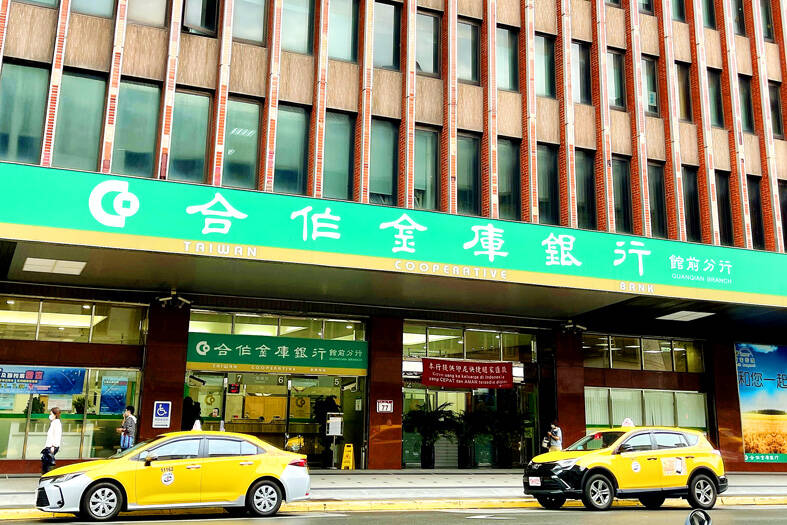State-run Taiwan Cooperative Bank (合作金庫商業銀行) has opened an office in the Czech Republic’s capital, Prague, to tap business opportunities in central Europe.
The banking arm of Taiwan Cooperative Financial Holding Co (合作金控) pressed ahead with plans to open the office despite the lingering COVID-19 pandemic.
Under chairman Lei Chung-dar (雷仲達), Taiwan Cooperative Financial has over the past few years expanded its global footprint in Asia, Europe, Australia and the US, aiming to boost revenue contributions from overseas operations.

Photo: George Tsorng, Taipei Times
The Prague office is intended to be a regional base of operations and might join forces with a subsidiary in Belgium to serve customers in developed western European nations, the lender said on Tuesday.
Taiwanese electronics makers Hon Hai Precision Industry Co (鴻海精密), Inventec Corp (英業達) and Wistron Corp (緯創資通), as well as beverage supplier King Car Industrial Co (金車), have created a presence in the Czech Republic, as bilateral trade ties are gaining momentum, the bank said.
Located in the center of Europe, the Czech Republic relies on tourism and industry as its main economic drivers, the lender said, adding that it has better infrastructure than eastern European countries, but lower personnel costs than western European markets, making it an ideal choice for developing business in central Europe.
The Prague office is Taiwan Cooperative Bank’s 26th overseas base of operations and the sixth established in the past five years.

POWERING UP: PSUs for AI servers made up about 50% of Delta’s total server PSU revenue during the first three quarters of last year, the company said Power supply and electronic components maker Delta Electronics Inc (台達電) reported record-high revenue of NT$161.61 billion (US$5.11 billion) for last quarter and said it remains positive about this quarter. Last quarter’s figure was up 7.6 percent from the previous quarter and 41.51 percent higher than a year earlier, and largely in line with Yuanta Securities Investment Consulting Co’s (元大投顧) forecast of NT$160 billion. Delta’s annual revenue last year rose 31.76 percent year-on-year to NT$554.89 billion, also a record high for the company. Its strong performance reflected continued demand for high-performance power solutions and advanced liquid-cooling products used in artificial intelligence (AI) data centers,

SIZE MATTERS: TSMC started phasing out 8-inch wafer production last year, while Samsung is more aggressively retiring 8-inch capacity, TrendForce said Chipmakers are expected to raise prices of 8-inch wafers by up to 20 percent this year on concern over supply constraints as major contract chipmakers Taiwan Semiconductor Manufacturing Co (TSMC, 台積電) and Samsung Electronics Co gradually retire less advanced wafer capacity, TrendForce Corp (集邦科技) said yesterday. It is the first significant across-the-board price hike since a global semiconductor correction in 2023, the Taipei-based market researcher said in a report. Global 8-inch wafer capacity slid 0.3 percent year-on-year last year, although 8-inch wafer prices still hovered at relatively stable levels throughout the year, TrendForce said. The downward trend is expected to continue this year,

A proposed billionaires’ tax in California has ignited a political uproar in Silicon Valley, with tech titans threatening to leave the state while California Governor Gavin Newsom of the Democratic Party maneuvers to defeat a levy that he fears would lead to an exodus of wealth. A technology mecca, California has more billionaires than any other US state — a few hundred, by some estimates. About half its personal income tax revenue, a financial backbone in the nearly US$350 billion budget, comes from the top 1 percent of earners. A large healthcare union is attempting to place a proposal before

Vincent Wei led fellow Singaporean farmers around an empty Malaysian plot, laying out plans for a greenhouse and rows of leafy vegetables. What he pitched was not just space for crops, but a lifeline for growers struggling to make ends meet in a city-state with high prices and little vacant land. The future agriculture hub is part of a joint special economic zone launched last year by the two neighbors, expected to cost US$123 million and produce 10,000 tonnes of fresh produce annually. It is attracting Singaporean farmers with promises of cheaper land, labor and energy just over the border.